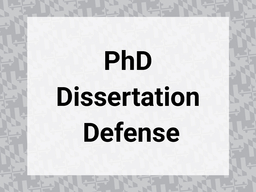PhD Dissertation Defense Announcement: Nuzhat Maisha
Location
Online
PhD Dissertation Defense Announcement: Nuzhat Maisha – Online Event
Date & Time
July 9, 2021, 12:00 pm – 1:00 pm
Description
Nuzhat Maisha, PhD Candidate
Advisor:
Dr. Erin Lavik
Associate Dean for Research and Faculty Development COEIT
Professor of Chemical, Biochemical, and Environmental Engineering, UMBC
DEVELOPING STEALTH NANOMATERIALS FOR INTRAVENOUS
ADMINISTRATION TO OVERCOME COMPLEMENT-MEDIATED HYPERSENSITIVITY REACTIONS
ABSTRACT:
A significant hurdle in clinical translation of intravenously infused nanoparticles is that it may lead to complement-mediated infusion reactions. The complement pathway is a part of the innate immune system, always active in eliminating threats to the immune system. However, complement activation can lead to the unwanted clearance of therapeutic nanomaterials. This can result in complement-mediated hypersensitivity reactions and cause anaphylaxis, which can even be fatal. Moreover, the bioavailability of the therapeutic is impacted as well. As 7-10% of the human population are prone to complement activation, this is a significant safety challenge while designing nanomaterials meant to be delivered intravenously. Materials properties and surface architecture of nanoparticles are significant contributors to the complement response. These dictate the interaction with plasma and complement proteins when the nanoparticles are in the bloodstream. We hypothesized that tuning materials properties would generate stealth nanoparticles that do not activate the complement pathways. To test our hypothesis, we also required a sensitive screening tool, as current methods of quantifying complement are qualitative or semiquantitative and often overlooked the interference introduced due to the presence of the nanomaterials. Hence, our research objectives were:- Developing sensitive screening tool for tracking changes in complement proteins in vitro for nanomaterials
- Utilizing the developed assay to understand what are the surface and materials properties that leads to complement activation in vitro
- Developing stealth nanomaterials by applying the gathered input and evaluate its impact in complement activation
To achieve our research objective, we first determined the optimum assay conditions to assess the complement-mediated response in vitro, mimicking the in vivo response with precision. Using the developed screening tool, we tracked how surface properties like zeta-potential and PEGylation impact the complement pathways by tracking the complement protein C5a. Based on the outcomes from screening a wide range of nanomaterials, we worked on developing stealth polyurethane-based nanomaterials that did not lead to complement activation and assessed its role as a hemostatic nanomaterial intended for intravenous infusion. Overall, the knowledge gathered from this dissertation will be critical in designing stealth nanomaterials that would not lead to complement-mediated infusion reactions.
Agenda:
12:00 PM EST - Presentation followed by questions from the audience.
After the questions from the public, the meeting will be closed for the committee discussion.
WEBEX Information:
Join by phone
+1-202-860-2110 United States Toll (Washington D.C.)
Access code: 120 286 8463
Tags:
